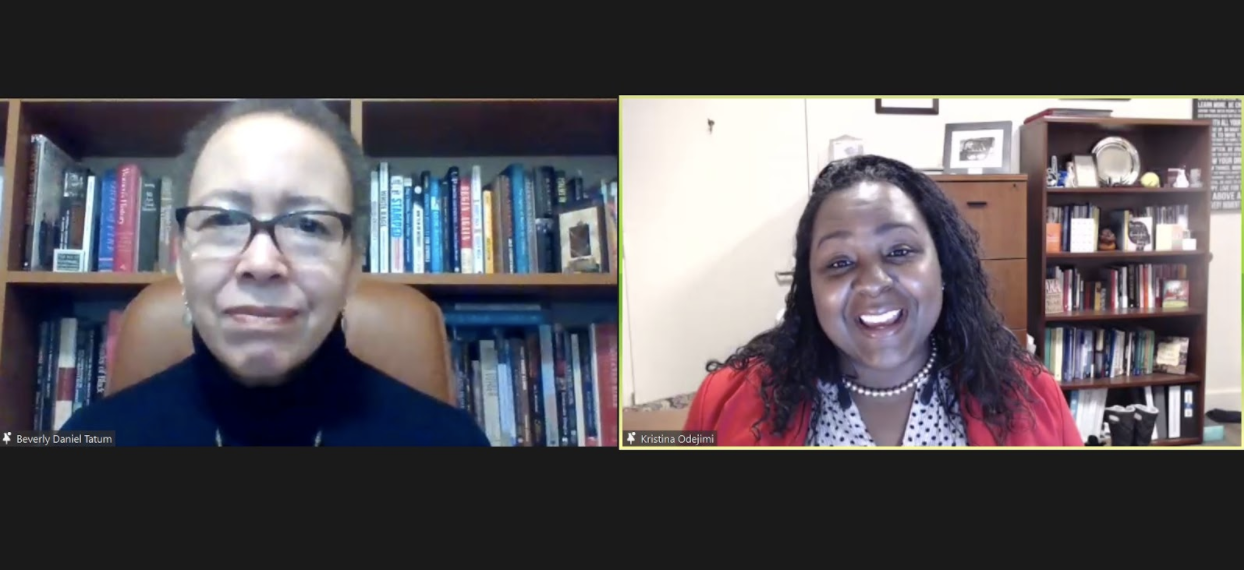Beverly Tatum H’06 speaks to Bowdoin community in annual MLK lecture
February 19, 2021
 Cora Dow
Cora DowThis Wednesday, over 50 years after Martin Luther King, Jr. spoke to the Bowdoin community in May of 1964, the annual lecture commemorating King took place online, featuring renowned speaker and author Beverly Tatum, H’06.
Tatum, president emerita of Spelman College, is the author of the bestselling book “Why Are all the Black Kids Sitting Together in the Cafeteria” and a leading speaker on issues of race and racism. In her hour-long lecture, moderated by Dean of Students Kristina Bethea Odejimi, Tatum addressed a wide range of topics, including the recent Capitol insurrection.
This topic was brought up almost immediately, and Tatum was quick to dismiss any parallels drawn between it and last summer’s Black Lives Matter protests.
“The comparison that is sometimes made between those sets of events … it is really a false equivalency on a number of fronts,” said Tatum. “It seems to me while people can put the two things in the same sentence, there’s no relationship between the two.”
Tatum also addressed the misconceptions behind the phrase “all lives matter,” invoked by those opposing the Black Lives Matter movement.
“Everybody’s life matters, but not everybody is being kneeled on by police officers … not everyone is being targeted in the way that Black people have been targeted by state sponsored violence. Not everyone is suffering from health disparities. Not everyone is living out the consequence of decades of economic exploitation and educational inequity,” Tatum said.
According to Tatum, some people hear the phrase “Black lives matter” and believe it to mean that only Black lives matter. She explained that, rather, when most people say that Black lives matter, they mean that Black lives also matter.
This explanation resonated with students who attended the lecture.
“I think [Tatum] made it very explicit why Black Lives Matter is important and … what to say to ‘all lives matter’ people,” said Sejal Prachand ’24 in a Zoom interview with the Orient. “I think that she did a really good job of doing that … very matter of factly, but also with some understanding of where they’re coming from, which can be frustrating, but important.”
Students also found Tatum’s description of prejudice and bias to be helpful. She used an analogy that compared growing up with racist comments and distorted representation in news and media to being surrounded by smog, and she went on to explain why this is harmful.
“You are sometimes not even aware that you’re breathing it in,” Tatum said. “To the extent that you breathe it in, it’s going to impact you, and sometimes even you’re going to breathe some of it back out. And so that is part of the challenge.”
Reflecting on the event, Molly Henderson, ’23, expanded the analogy, describing the way that even more subtle prejudice, or “smog,” can be harmful.
“I feel like that can sometimes be … harder to combat because … you can’t necessarily see it and be like, there’s the pollution, this is the problem,” Henderson said in a Zoom interview with the Orient.
Tatum also addressed how colleges can take steps toward racial equity through talking about how to undo racism and center Black lives in their communities. To do this, she suggested paying attention to what she calls the ABCs.
“The A stands for affirming identity. The B stands for building community. The C stands for cultivating leadership,” Tatum said. “The A, or affirming identity, is perhaps the most important of the three; in some ways the most fundamental, and it speaks to the fact that everyone, all of us … regardless of your own racial or ethnic background, everyone wants to feel seen, heard and understood.”
In order to foster a better sense of community, Tatum also suggested that institutions consider which perspectives are missing in the student body, faculty, reading lists and community programming.
After these thoughts, Tatum discussed the disproportionate rates of COVID-19 cases in Black and brown communities, affirmative action and the history behind the 1944 GI Bill and anti-racism. She also encouraged attendees to take the Implicit Association Test (IAT) and to read the books “White Fragility” by Robin DiAngelo, “When Affirmative Action was White” by Ira Katznelson and “Biased” by Jennifer Eberhardt.
Finally, Tatum tackled Odejimi’s closing question: “Where do we go from here?”
“We started our conversation talking about … the insurrection at the Capitol,” she said. “It seems to me that it was a vision of chaos. January 20, President Biden gave his inaugural speech. We heard that wonderful poem by Amanda Gorman and … that was, I think, a vision of community. And so here we have an opportunity for each of us every day to decide: am I choosing chaos or am I choosing community?”

Comments
Before submitting a comment, please review our comment policy. Some key points from the policy: